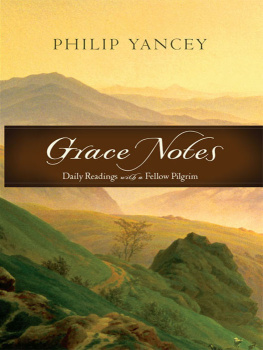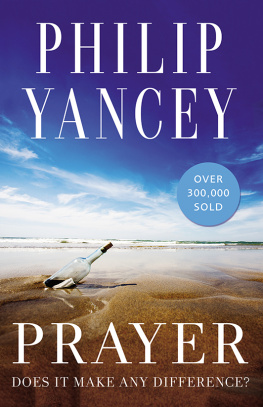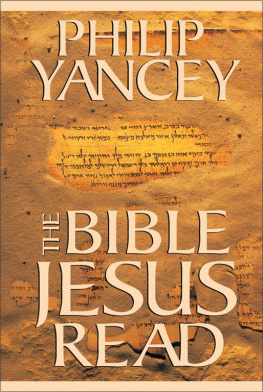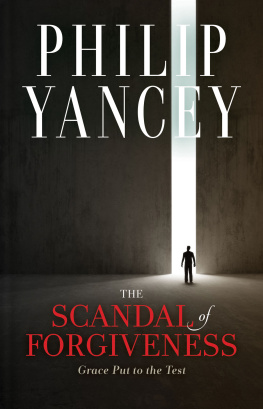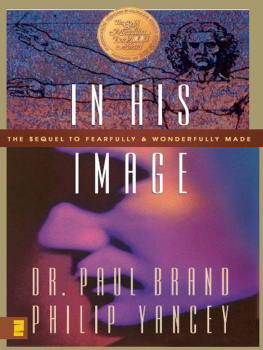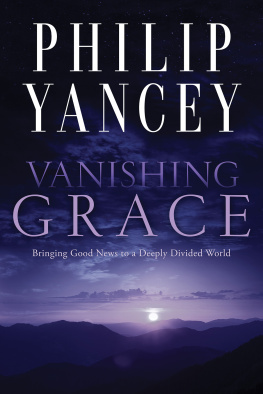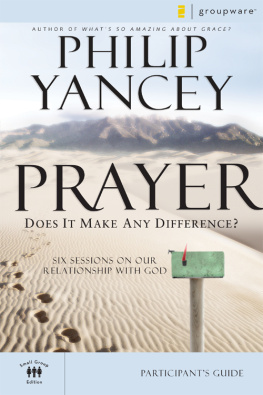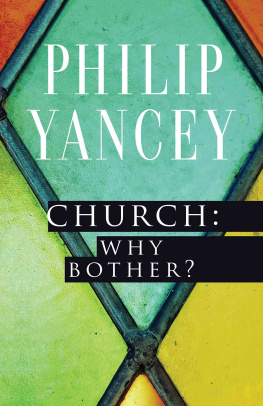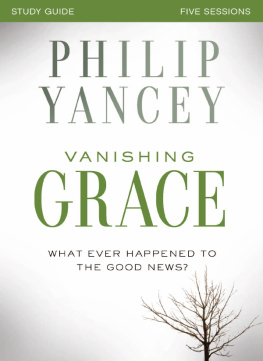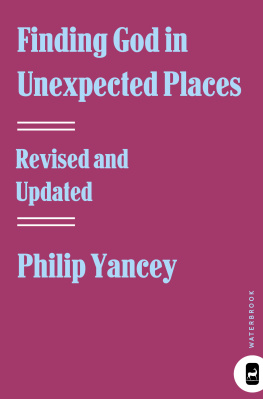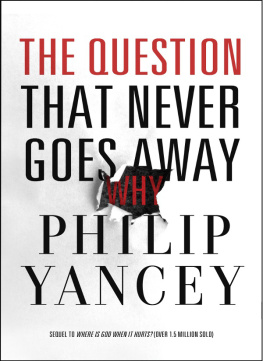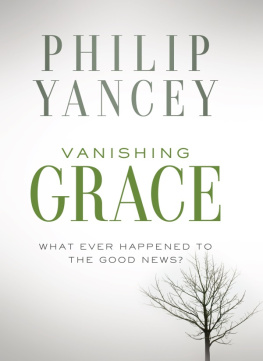Also by Philip Yancey
The Bible Jesus Read
Church: Why Bother?
Disappointment with God
Finding God in Unexpected Places
I Was Just Wondering
The Jesus I Never Knew
Meet the Bible (with Brenda Quinn)
Prayer: Does It Make Any Difference?
Reaching for the Invisible God
Rumors of Another World
Soul Survivor
The Student Bible (with Tim Stafford)
Whats So Amazing About Grace?
Where Is God When It Hurts?
By Philip Yancey and Dr. Paul Brand
Fearfully and Wonderfully Made
The Gift of Pain
In His Image
In the Likeness of God
ZONDERVAN
Grace Notes
Copyright 2009 by Someone Cares Charitable Trust.
All rights reserved under International and Pan-American Copyright Conventions. By payment of the required fees, you have been granted the non-exclusive, non-transferable right to access and read the text of this e-book on-screen. No part of this text may be reproduced, transmitted, down-loaded, decompiled, reverse engineered, or stored in or introduced into any information storage and retrieval system, in any form or by any means, whether electronic or mechanical, now known or hereinafter invented, without the express written permission of Zondervan.
ePub Edition October 2009 ISBN: 978-0-310-56214-6
This title is also available as a Zondervan ebook.
Visit www.zondervan.com/ebooks.
This title is also available in a Zondervan audio edition.
Visit www.zondervan.fm.
Requests for information should be addressed to:
Zondervan, Grand Rapids, Michigan 49530
ISBN 978-0-310-28772-8
All Scripture quotations, unless otherwise indicated, are taken from the Holy Bible, New International Version . NIV . Copyright 1973, 1978, 1984 by International Bible Society. Used by permission of Zondervan. All rights reserved.
Any Internet addresses (websites, blogs, etc.) and telephone numbers printed in this book are offered as a resource. They are not intended in any way to be or imply an endorsement by Zondervan, nor does Zondervan vouch for the content of these sites and numbers for the life of this book.
All rights reserved. No part of this publication may be reproduced, stored in a retrieval system, or transmitted in any form or by any meanselectronic, mechanical, photocopy, recording, or any otherexcept for brief quotations in printed reviews, without the prior permission of the publisher.
Cover design by Jeff Gifford
Cover photo by Hermitage Museum, St. Petersburg / SuperStock
Interior design by Beth Shagene
A writer should strive to be a person on whom nothing is lost.
HENRY JAMES
CONTENTS


I have been writing full time for three decades, long enough for a publisher to propose this book of readings drawn from twenty-some books and numerous articles. As I read through them I feel a bit like Rip Van Winkle, going over experiences and thoughts from as long as twenty or thirty years ago. Ive doubted, believed, doubted again, changed, grown.
I have also been privileged to travel widely, to observe the church at work in a variety of cultures, and to interview some fascinating people, both exemplary and blameworthy. Always I return to my office and sort out these encounters in articles and books. I find that other people have a romantic view of a writers life, which I feel a need to correct. I once got a letter from a student inquiring whether I might need an intern. I could do research for you, or office work. Or perhaps just sit and watch you write.
I sent her a polite turndown, though this is what I should have responded: Young woman, are you crazy? No, you cant watch me write! I cant bear to have anyone in the same room. Writing is an act of utmost privacy and paranoia, and no one dare cross that barrier. Plus, you would soon get bored out of your mind. Why dont you stare at a rock all day or watch a TV screen with the power offfar more exciting than watching someone write.
Alone in a room, the writer sits with a notepad or computer keyboard and manipulates abstract symbols, arranging and rearranging them. As Philip Roth explains the process, I turn sentences around. Thats my life. I write a sentence and I turn it around. Then I look at it and I turn it around again. Then I have lunch. Then I come back in and write another sentence. Then I have tea and turn the new sentence around. Then I read the two sentences over and turn them both around. Then I lie down on my sofa and think. Then I get up and throw them out and start from the beginning. Roth has described my day precisely.
Of all the arts, writing is the meekest. Painters use color and sculptors work with three dimensions, both media so much more arresting than the writers thin marks of abstraction. Other art formsmovies, painting, dance, musicwe encounter directly, sensually; only writing requires an intermediate step, literacy, for a person to perceive it. Show a copy of King Lear to an Amazon Indian tribe and theyll see something resembling pepper sprinkled on a page.
Surveys reveal that writers rank very high on the list of addiction-prone professionals. They chain-smoke, mainline caffeine, and turn to alcohol at an alarming rate. Why? Every day a writer must cope with a deep-seated paranoia:
I have nothing to say, Ive said it all before, Im a fake and a hypocrite, I write in clichs. In addition, writing is such a disembodied act that we unconsciously seek ways to involve other body parts, even if it means moving a cup, glass, or wrapped tobacco tube from table to mouth and back. Fortunately, I live in Colorado, an outdoorsy state that daily beckons me to reconnect with the planet in more healthy ways (and in the process, avoid writing).
When I speak before audiences, I feel as if I have just emerged from a cave to face bright lights and microphones. What are the five greatest trends confronting the church today? someone asks, and I blink into the light. How do you see your influence in the world? someone else asks. To all such questions I want to reply, How should I knowIve been sitting in my basement office. Instead, I smile politely and try to say something sensible.

The question, Have you always wanted to be a writer? inevitably comes up as well. I have to confess that like most young boys I wanted to be a fireman or a baseball player. Later, while attending graduate school at Wheaton College, I needed a job to pay tuition bills. When I knocked on the doors of various Christian organizations headquartered nearby, the only offer came from Harold Myra, then publisher of Campus Life, a magazine for teenagers. That first year I filed reports on campus issues, wrote brochure copy, organized photo files, and generally acted as editorial errand boy.
Harold had created an ethos that valued writing above all else, and he mentored his young staff writers with endless patience. Leaning back in his creaky wooden chair he would say, Philip, this article is 80 percent of the way there, which I soon understood to be a euphemism for This article stinks and you might as well start over. I literally learned on the job, working on active verbs, then sentence syntax, then paragraphs and article structure, and ultimately books. Writing can be learnedI knew almost nothing when I started.
Next page
